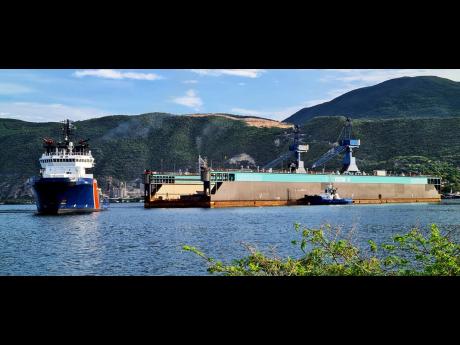Shipping Industry: The year that was (Part 1)
As we bid farewell to a year of mixed fortunes in the maritime world, Shipping Industry revisits the biggest stories that shaped the maritime sector around the region and globally. The year 2023 was marked by meaningful milestones and achievements for the Caribbean, highlighting the region’s strength and progress. From the arrival of Jamaica’s first floating dock to the signing of a historic agreement between the Caribbean Shipping Association (CSA) and the Inter-American Development Bank (IDB), the shipping and logistics industry has much to celebrate.
However, the global landscape also witnessed decisions that promise to leave an enduring impact on the sector. As the industry expectantly looks ahead, we recap the events that defined 2023.
ARRIVAL OF JAMAICA’S FIRST FLOATING DOCK
German Ship Repair Jamaica Limited (GSRJ), a joint venture involving German, Turkish, and Jamaican investors, welcomed its first floating dock in Kingston on August 24. The 215-metre-long Panamax-size dock was towed across the Atlantic by the deep-sea tug Titan from Bremerhaven, Germany. Now situated in the GSRJ shipyard in Kingston Harbour, the dock commissioned and registered with the Jamaica Ship Registry, and renamed as JAM-DOCK 1.
CORAH ANN ROBERTSON SYLVESTER ELECTED SAJ PRESIDENT
Corah Ann Robertson Sylvester was elected president of the Shipping Association of Jamaica (SAJ) at its annual general meeting on November 17. The CEO of Seaboard Freight and Shipping Jamaica Limited is the second woman to hold the presidency in the SAJ’s 85-year existence. Her prior experience includes a three-year tenure as vice-president and a directorship since 2005.
With almost three decades of experience at local and regional levels, Robertson Sylvester’s career highlights include being the first woman elected president of the Caribbean Shipping Association in 2003, being chairperson of the Maritime Authority of Jamaica, and holding a council position at the Caribbean Maritime University. Her outstanding contributions to the industry were recognised with her induction into the SAJ Hall of Fame in 2021.
CSA, IDB SIGN AGREEMENT TO ACCELERATE SHIPPING INDUSTRY DECARBONISATION
The CSA and the IDB signed a memorandum of understanding aimed at advancing decarbonisation efforts within the regional shipping industry on March 17. The partnership underscores a commitment to reduce greenhouse gas emissions in Latin America and the Caribbean, particularly within the maritime transport sector. The agreement, endorsed by IDB Vice-President for Countries Richard Martínez, CSA President Marc Sampson, and CSA General Manager Milaika Capella Ras during the annual meeting of IDB and IDB Invest in Panama, aims to expedite the industry’s decarbonisation and foster economic and social development in the region.
The three-year arrangement includes conducting studies focused on decarbonising maritime transport and enhancing the operations of seaports and harbours in the Caribbean. The partnership will also address technical and operational aspects related to reducing the use of fossil fuels in seaport activities such as operation and maintenance.
CARRIERS PLEDGE FULL ADOPTION OF ELECTRONIC BILLS OF LADING BY 2030
Nine major carriers committed to the full adoption of an electronic bill of lading (eBl) by 2030 on February 15, shared the Digital Container Shipping Association (DCSA). This significant shift from traditional paper bills of lading will result in substantial cost savings, with the potential to reach US$6.5 billion in direct costs for maritime stakeholders. The DCSA sees an annual global trade growth of US$30 billion-US$40 billion with this shift.
Under the commitment, the carriers will initiate the conversion of 50 per cent of original bills of lading to digital within the next five years, with the complete transition to eBl expected by 2030. This step will accelerate the digitalisation of container trade and improve the customer experience and industry sustainability. The DCSA’s initiative reflects an effort among major players to modernise and streamline documentation processes for greater efficiency and cost-effectiveness.

